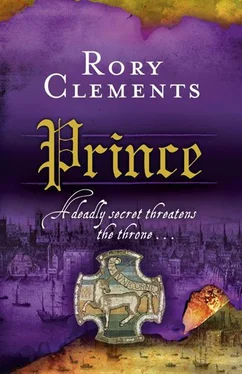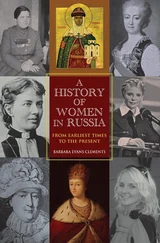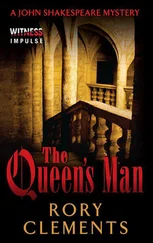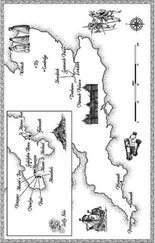Rory Clements - Prince
Здесь есть возможность читать онлайн «Rory Clements - Prince» весь текст электронной книги совершенно бесплатно (целиком полную версию без сокращений). В некоторых случаях можно слушать аудио, скачать через торрент в формате fb2 и присутствует краткое содержание. Жанр: Исторический детектив, на английском языке. Описание произведения, (предисловие) а так же отзывы посетителей доступны на портале библиотеки ЛибКат.
- Название:Prince
- Автор:
- Жанр:
- Год:неизвестен
- ISBN:нет данных
- Рейтинг книги:5 / 5. Голосов: 1
-
Избранное:Добавить в избранное
- Отзывы:
-
Ваша оценка:
- 100
- 1
- 2
- 3
- 4
- 5
Prince: краткое содержание, описание и аннотация
Предлагаем к чтению аннотацию, описание, краткое содержание или предисловие (зависит от того, что написал сам автор книги «Prince»). Если вы не нашли необходимую информацию о книге — напишите в комментариях, мы постараемся отыскать её.
Prince — читать онлайн бесплатно полную книгу (весь текст) целиком
Ниже представлен текст книги, разбитый по страницам. Система сохранения места последней прочитанной страницы, позволяет с удобством читать онлайн бесплатно книгу «Prince», без необходимости каждый раз заново искать на чём Вы остановились. Поставьте закладку, и сможете в любой момент перейти на страницу, на которой закончили чтение.
Интервал:
Закладка:
All eyes turned to Thomas Bedwell, Storekeeper of the Ordnance. He had a pair of spectacles on the table in front of him, which he now picked up and placed on the bridge of his nose. Bedwell was in his mid fifties, a few years younger than Lee though he looked a fair bit older. As an engineer, he had applied new technologies in the building of the defensive walls of Dover harbour and Portsmouth and along the Thames. He had modernised gunnery with his rules for elevation of cannon to establish the distance a ball would travel. More than that, he claimed to have devised a method of establishing longitude at sea. Now his primary task was ensuring the care and safe-keeping of the ordnance and munitions held in the White Tower armoury and the nearby storehouses in the Minories, once home to nuns from the Order of St Clare.
‘Well, Mr Bedwell?’ Cecil said, an edge of impatience in his tone. ‘Where did the powder come from?’
‘Not the Tower. I am certain of that. But nor was it made in someone’s backyard, for the quantity used was too great. I visited the site of the explosion and from the extent of the blast, I would say the barrel contained one hundredweight or more of fair quality powder.’
‘So where?’
‘From one of the mills. The powder is supposed to be kept secure in locked vaults, but some of the mill owners fall short. Powder is left lying about. Though the mills are supposed to be strictly guarded and are inspected regularly, it is entirely possible that an amount has been stolen or sold illegally.’
‘Could it not have been stolen in transit?’ Shakespeare asked.
‘Yes, that is possible, but less likely. Had a highway robbery occurred, I would have been informed straightway, and I have had no such reports in recent months. The other places powder might have been acquired is from county stores or from the hold of a ship-of-war. County stores do not hold great quantities, but a ship is a distinct possibility. However, powder is usually not loaded until shortly before a ship weighs anchor, to reduce the risk of mishaps. My firm opinion is that a powdermill is the source.’
‘Where are they, Mr Bedwell?’
‘The nearest to London is Rotherhithe. It is powered by a watermill on a small tributary of the Thames. A little further afield, in Essex, you will find the Three Mills site on the river Lea at Bromley-by-Bow, which has recently been converted to powder production. There are also established mills at Faversham in Kent and Godstone in Surrey, and we have lately licensed a saltpetre works east of London in Suffolk.’
Cecil approached the table. He had heard all he needed from the ordnance men. ‘Thank you, Mr Bedwell. I know you have brought papers with further details of the positioning of these mills, their keepers and production details. I would ask you to leave those with Mr Shakespeare. And Sir Henry, if you see Her Majesty before I do, please assure her of our most rigorous efforts in this matter.’
‘Quite so, Sir Robert.’ Sir Henry Lee rose from his seat, followed by Bedwell. ‘I bid you all good day, leaving you with this thought. All spring, the Queen has talked of nothing else but her racehorse, Great Henry. She is convinced he will win the Golden Spur for the third year; but this news has quite distracted her. She considers the attack a personal affront to her authority. I would have her talking horses again, gentlemen, not raging like a North Sea tempest about gunpowder. That way we may all sleep a little better. So I urge you to put an end to this nonsense in short order. Until you do so, Her Majesty is expecting regular reports.’
After Lee and Bedwell had departed, Cecil turned to Mills. ‘What are your thoughts, Frank?’
‘Well, it clearly wasn’t Marlowe.’
Cecil sighed. Wearily, he rubbed the hunch of his shoulder that had earned him the epithet Robin Crookback. He was a small man, neat and self-contained. Always in control — in control of himself, of others, of his surroundings. ‘Yes,’ he said impatiently. ‘I think that is clear enough. It wasn’t Marlowe. So who was it?’
Mills lowered his pinpoint eyes, chastened. He was a tall man, about Shakespeare’s height, but thinner and older. He was becoming more and more stooped, as if he had invisible weights pressing down on him. Perhaps it was the burden of his sins, or the adulteries of his wife, that pulled him down.
He and Shakespeare had worked together for years, first for Walsingham and now under Cecil. Though their relationship had been reasonably cordial in recent months, Shakespeare could never forget that Mills had once betrayed him. Yes, he would work with him, but he would never trust him.
Mills’s great talent was in drawing information from suspects. His presence alone could often produce results as quickly as Topcliffe’s rack. At times the two interrogators had worked together — Topcliffe applying the engines of despair, Mills coaxing the confession or required information with soft words. He understood that the anticipation of agony and mutilation could often be as bad, worse even, than the pain itself.
Shakespeare disliked this in Mills, this resort to fear. Yet he had to concede that there was more to the man than this. Mills had a sharp, political mind that understood better than anyone the significance of intercepted correspondence between the courts of Europe — what to dismiss as tittle-tattle or disinformation, and what needed acting upon.
‘A witness speaks of seeing two men rolling a barrel from a small cart,’ Shakespeare said. ‘One man was tall, the other not so tall. Other than that the witness could describe nothing remarkable about them and paid them no heed. Their features were concealed by caps or hoods.’
Silence descended on the room. Sir Robert Cecil, privy councillor, chief minister in all but name, did not expect Shakespeare and Mills to speak unless they had something noteworthy to say. In many ways he was like his predecessor, Walsingham; that fastidious attention to detail, that utter belief in the power of secret knowledge. Yet Cecil was not Walsingham. He was too worldly for that. Cecil’s father had brought him up to understand the mechanics of power — and how to acquire it — without ever asking himself why he should want it. It was power for duty’s sake and it was as natural as eating, breathing or pissing to Robert Cecil. Walsingham, on the other hand, had acquired power for a purpose. It was for his sovereign, his religion and his country. He had beggared himself getting it and holding it, and had died in penury because of it.
The seconds passed in the meeting room, hidden deep in the somewhat anonymous house. Cecil’s father, Lord Burghley, Elizabeth’s longest-serving and most faithful minister, had bought it for his second son so that he should have a town place of his own; his other, greater mansion on the Strand, would go to Robert’s older half-brother, Thomas, along with the title Burghley. Robert knew, however, that he was his father’s chosen son and that he would inherit the jewel of his father’s holdings, the great palace of Theobalds in Hertfordshire.
‘And yet we cannot ignore the Marlowe connection,’ Shakespeare said, breaking the silence at last, glancing towards Mills for support. ‘Anything that involves Rob Poley must always raise suspicion. And what is Topcliffe’s interest?’
Shakespeare noticed the tightening of Cecil’s little fist, the stretching of the short and slender neck away from the hunch; most would not. Was it the name Poley or Topcliffe that brought a chill to this room?
‘Frank?’ Cecil demanded, as if Shakespeare had not spoken.
Mills studiously avoided the question of Marlowe. ‘There are many in this city who would wish harm to our Dutch friends, Sir Robert-’
Shakespeare recoiled slightly as Mills spoke. The man had midden breath and it wafted across the table at him. Before Mills could expound further, he interrupted. ‘If Marlowe was in any way involved in the intimidating placards posted outside the Dutch church, then we must wonder about a possible connection to the men who laid powder in that very place. Their method was more extreme, yet their target was the same. The Council — and you Sir Robert — thought Marlowe a fit subject for investigation alive. Has so much changed now he is dead?’
Читать дальшеИнтервал:
Закладка:
Похожие книги на «Prince»
Представляем Вашему вниманию похожие книги на «Prince» списком для выбора. Мы отобрали схожую по названию и смыслу литературу в надежде предоставить читателям больше вариантов отыскать новые, интересные, ещё непрочитанные произведения.
Обсуждение, отзывы о книге «Prince» и просто собственные мнения читателей. Оставьте ваши комментарии, напишите, что Вы думаете о произведении, его смысле или главных героях. Укажите что конкретно понравилось, а что нет, и почему Вы так считаете.












